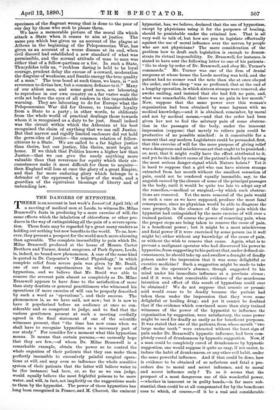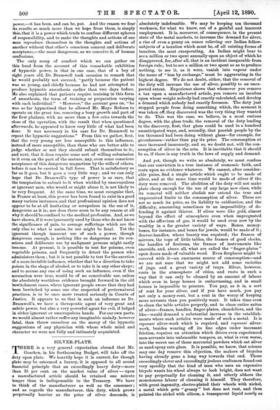THE DANGERS OF HYPNOTISM. T HERE is an account in last
week's Lancet (of April 5th) of a meeting of medical men at Leeds, to witness Dr. Milne Bramwell's feats in producing by a mere exercise of will, the same effects which the inhalation of chloroform or ether pro- duces in the way of extinguishing all the pain of a severe opera- tion. These feats may be regarded by a great many readers as holding out nothing but new benefits to the world. To us, how- ever, they present a prospect for the world much more alarming than agreeable. The complete insensibility to pain which Dr. Milne Bramwell produced at the house of Messrs. Carter Brothers and Turner, dental surgeons, of Park Square, Leeds, is, indeed, no brand-new phenomenon. A case of the same kind is quoted in Dr. Carpenter's "Mental Physiology," in which complete relief from severe pain was given by Mr. Braid, one of our first experimenters in what is now called hypnotism, and we believe that Mr. Braid was able to remove the severest pain almost as completely as Dr. Milne Bramwell appears to have done to the satisfaction of more than sixty dentists or general practitioners who witnessed his operations (if mere exercise of will can be properly described by such a word as operations '), and their success. The phenomenon is, as we have said, not new ; but it is new to have it popularised before an audience at once so con- siderable and so competent to judge, and to find that the various gentlemen present at such a meeting cordially agreed in the final statement of one of the scientific witnesses present, that "the time has now come when we shall have to recognise hypnotism as a necessary part of our study." For consider for a moment what this hypnotism means. It means that certain persons,—we earnestly hope that they are few,—of whom Dr. Milne Bramwell is a remarkable example, obtain the power so to control the whole organism of their patients that they can make them perfectly insensible to excessively painful surgical opera- tions at will, and may even so influence the whole sensitive system of their patients that the latter will believe water to be (for instance) bad beer, or, so far as we can judge, would equally believe the most frightful poisons to be mere water, and will, in fact, act implicitly on the suggestions made to them by the hypnotist. The power of these hypnotists has long been recognised in France, and M. Charcot, the eminent hypnotist, has, we believe, declared that the use of hypnotism, except by physicians using it for the purposes of healing, should be punishable under the criminal law. That is all very well to talk of, but how are you to legislate effectually against the use of moral influence over the nerves, by people who are not physicians ? The mere consideration of the problem how to draft such legislation is enough to demon- strate its virtual impossibility. Dr. Bramwell, for instance, is stated to have sent the following letter to one of his patients : "Go to sleep by order of Dr. Bramwell, and obey Mr. Turner's commands." Mr. Turner was one of the firm of dental surgeons at whose house the Leeds meeting was held, and the patient had no sooner read the note than she at once obeyed the order, and the sleep "was so profound, that at the end of a lengthy operation, in which sixteen stumps were removed, she awoke smiling, and insisted that she had felt no pain, and, what was remarkable, that there was no pain in her mouth." Now, suppose that the same power over this woman's organisation had been obtained by some layman with no medical knowledge,—and it is obtained, remember, by moral and not by medical means,—and that the order had been given her not to feel the salutary pain of some obstruc- tion in the passages of the body, under the innocent impression (suppose) that merely to relieve pain could be productive of no possible mischief : is it conceivable for a moment that any modern Legislature could be persuaded, first, that this exercise of will for the mere purpose of giving relief was a dangerous and mischievous act that ought to be punished; or, next, that it might really have the effect attributed to it, and yet be the indirect cause of the patient's death by removing the most serious danger-signal which Nature hoists ? Yet it is hard to suppose that a girl who can have sixteen stumps extracted from her mouth without the smallest sensation of pain, could not be rendered equally insensible, say, to the anguish caused by the closure of some of the principal passages in the body, until it would be quite too late to adopt any of the remedies,—medical or surgical,—by which such obstruc- tions are removed. Yet the mere removal of the pain would in such a case as we have supposed, produce the most fatal consequence, since no physician would be able to diagnose the case properly, in the absence of the violent pain which the hypnotist had extinguished by the mere exercise of will over a trained patient. Of course the power of removing pain, when the proper steps are being taken to remove the cause of pain, is a beneficent power ; but it might be a most mischievous and fatal power if it were exercised by some person (as it well might be) either without any knowledge of the cause of pain, or without the wish to remove that cause. Again, what is to prevent a malignant operator who had discovered his power to hypnotise, from suggesting to his patient that, under defined cir- cumstances, he should take up and swallow a draught of deadly poison under the impression that it was some delightful or curative medicine ? Such a suggestion might be made to take effect in the operator's absence, though suggested to his mind under his immediate influence at a previous sgance ; and if it were, what conceivable evidence of the murderous intention and effect of this result of hypnotism could ever be obtained ? We do not suppose that arsenic or prussic acid would cease to be deadly because the patient had taken them under the impression that they were some delightful or healing drug ; and yet it cannot be doubted that if the evidence which convinced more than sixty trained witnesses of the power of the hypnotist to influence the organisation by suggestion, were satisfactory, the same power might be used for deadly as easily as for beneficent purposes. It was stated that one of the patients, from whose mouth "two large molar teeth" were extracted without the least sign of pain under Dr. Bramwell's hypnotic influence, had been com- pletely cured of drunkenness by hypnotic suggestion. Now, if a man could be completely cured of drunkenness by hypnotic suggestion, one would suppose it quite as easy, if not easier, to . induce the habit of drunkenness, or any other evil habit, under the same powerful influence. And if that could be done, how is evidence to be obtained of so nefarious and fatal a pro- cedure due to moral and secret influence, and to moral and secret influence only ? To us it seems that the prospect of a most dangerous use of this wonderful power, —whether in innocent or in guilty bands,—is far more sub- stantial, than could be at all compensated for by the beneficent uses to which, of course,—if it be a real and considerable
power,—it has been, and can be, put. And the reason we fear its results so much more than we hope from them, is simply this, that it is a power which tends to confuse different spheres of responsibility, and to make the thoughts and actions of one man reproduce themselves in the thoughts and actions of another without that other's conscious consent and deliberate acceptance,—the most dangerous, as we conceive it, of human confusions.
The only scrap of comfort which we can gather on this head from the account of this remarkable exhibition of hypnotic power, is that in one case, that of a boy of eight years old, Dr. Bramwell took occasion to remark that he would probably not succeed, "partly because the patient was so young, and chiefly because he had not attempted to produce hypnotic aniesthesia earlier than two days before. He also explained that patients require training in this form of anwsthesia, the term of training or preparation varying with each individual." "However," the account goes on, "he was so far hypnotised that he allowed Mr. Mayo Robson to operate on the great toe, removing a bony growth and part of the first phalanx, with no more than a few cries towards the close of the operation, with the result that when questioned afterwards, he appeared to know very little of what had been done. It was necessary in his case for Dr. Bramwell to repeat the hypnotic suggestions." From this we gather, first, that the very young are less susceptible to this influence, instead of more susceptible, than those who are better able to judge whether or not they should submit themselves to it; and next, that it does require some sort of willing submission to it even on the part of the mature, nay, even some conscious acceptance of this dangerous magnetism by the wills of others, before it can be exerted in full force. That is satisfactory so far as it goes, but it goes a very little way ; and we can only llope that Dr. Bramwell's type of power is so rare, that the temptation to submit to it when wielded by unscrupulous or ignorant men, who would or might abuse it, is not likely to be very frequent. At the same time, we must recognise that, in France at least, this power has been found to exist in a good many various instances, and that professional opinion does not appear to be at all hesitating or scrupulous in the use of it, dangerous as it is; nor does there seem to be any reason at all why it should be confined to the medical profession. And, as we have shown, if it were ignorantly used by those who do not know the significance of pain, to assuage sufferings which are the only clue to what is amiss, its use might be fatal. Yet the ignorant though innocent use of such a power, though dangerous enough, is nothing like so dangerous as its con- scious and deliberate use by malignant persons might easily become. At present, it is possible to test for poisons, even vegetable poisons, and frequently to detect the person who administers them ; but it is not possible to teat for the exertion of a mere invisible influence, whether that be a direction to take poison in the shape of alcohol, or to take it in any other shape; and to accuse any one of using such an influence, even if the accusation were true, would be of no conceivable use, unless the absolutely worthless evidence brought forward in the old bewitchment cases, where ignorant people swore that they had been bewitched by some one else suspected of preternatural practices, is to be once more treated seriously in Courts of Justice. It appears to us that in such an influence as Dr. Bramwell's, we have a therapeutic agent of very great and subtle power, but also a very powerful agent for evil, if lodged in either ignorant or unscrupulous hands. For our own parts, we would almost rather suffer any imaginable malady, however fatal, than throw ourselves on the mercy of the hypnotic suggestions of any physician with whose whole mind and character we were not fully and intimately acquainted.



































 Previous page
Previous page